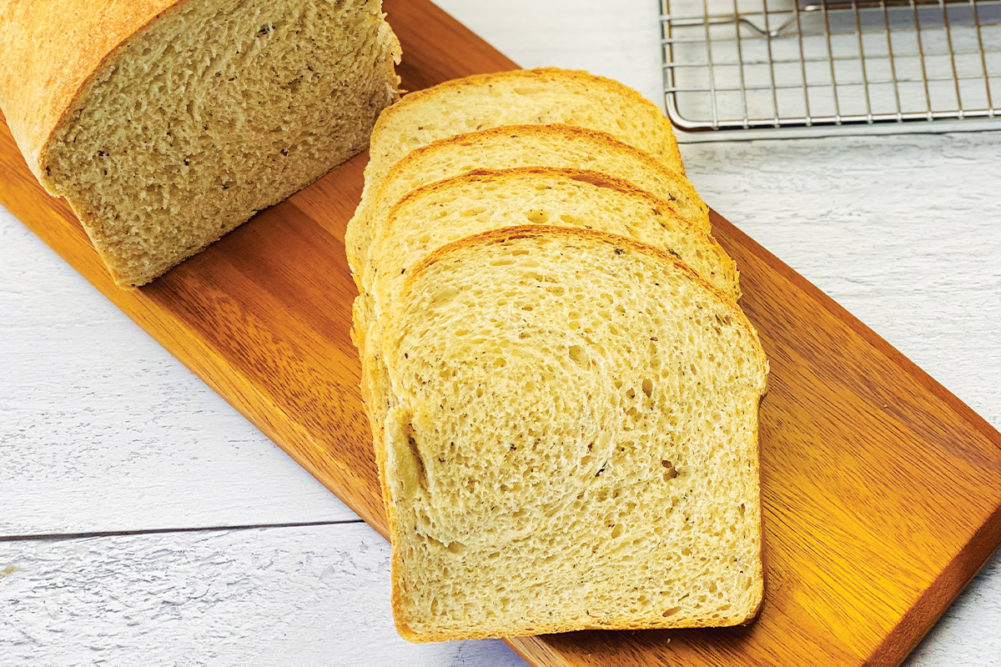KANSAS CITY – Gluten-free flours, keto-friendly ingredients and ancient grains all have boosted bread sales in past years. What’s next? How about seaweed that gives bread nutritional and environmental benefits.
Sea & Flour is launching a carbon-negative bread with seaweed that provides vitamin A, vitamin K, iron, folate, calcium, magnesium and zinc. The first question that might come to mind: How does it taste?
“There are a lot of unusual tasting seaweed products out there, ones that might be called an acquired taste,” said Arlin Wasserman, chief executive officer and co-founder.
Sea & Flour, to address taste, uses a patented process for handling seaweed as it comes out of the water.
“There are different nutritional properties and organoleptic or culinary properties of seaweed,” Mr. Wasserman said. “We figured out how to preserve the best of those while making it work in baking. That’s kind of our secret sauce.”
Sea & Flour incorporated as a company in September 2021 and promoted the bread at the United Nations’ Ocean Conference held June 27 to July 1 in Lisbon, Portugal. The bread will launch initially in the mid-Atlantic region and the Northeast and possibly could extend to the US Southwest.
“We hope to go national within a year,” Mr. Wasserman said. “We do have a goal for international expansion.”
A Pullman-style 720-gram loaf with 14 slices sells for a suggested retail price of $5.25. The bread has 60% to 70% less sodium than a traditional Pullman-style loaf, according to the company. Seaweed makes up about 100 grams in each loaf. Other ingredients are wheat flour, water, whole wheat flour, yeast, butter, milk powder, sugar and salt.
“It’s a large amount of seaweed because you need that much to make a difference for the planet and really make a difference for your health,” Mr. Wasserman said.
The bread is carbon-negative because 100 grams of seaweed are equivalent to taking 4 lbs of carbon out of the atmosphere, according to the company. The carbon footprint for manufacturing the bread is about 1 lb of carbon into the atmosphere, which means the bread is 3 lbs carbon-negative.
Farming seaweed increases oxygen levels in the ocean while decreasing carbon levels and nitrogen levels, according to the company. Sea & Flour sources the seaweed from where it is farmed in New England, Alaska and Southern California. The company avoids sourcing from Asia because of industrial pollution concerns.
Penelope Wasserman, Arlin’s wife, serves as president and co-founder of Sea & Flour. They both live and work together in Philadelphia. Mr. Wasserman also owns Changing Tastes, a consultancy. Ms. Wasserman is a managing consultant at Changing Tastes. She serves as a leadership ambassador for the US Bone Health and Osteoporosis Foundation.
COVID-19 may have affected children’s health, including bone structure, Mr. Wasserman said.
“We know that this generation, in addition to missing two years of gym class and running around outdoors, is set up to have osteoporosis in a few decades,” he said.
Ms. Wasserman spoke about how the bioavailability of calcium in seaweed may benefit strong bones in children. She said children should be educated about growing strong bones, which may help avoid osteoporosis later in life, jus tas they are educated about strong teeth and dental hygiene.
“We really think this bread is delightful,” Ms. Wasserman said. “In 100 years, we believe that all bread will be made this way. It’s going to help the planet. It’s going to help people. Osteoporosis will go the way of polio.”






